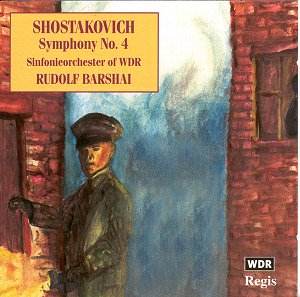This symphony was a water-shed in Shostakovich’s career,
and despite its disappearance – or rather non-appearance - for twenty-five
years, remains one of his greatest and most compelling works. I shall
not repeat the well-known story of the events surrounding the work;
suffice it to say that the piece was withdrawn from rehearsals in the
wake of the Lady Macbeth affair, and replaced with the equally
great, but more equivocal, Symphony no.5.
Barshai conducts a truly superb performance here. There
is no point in doing this piece at all unless you go for the jugular,
glorying in the excesses and the deliberately expressed megalomania.
Some passages are truly terrifying, such as the headlong rush of string
fugato which leads to the main climax of the first movement –
never have I heard it attempted so fast, and there is a thrilling feeling
of the players hanging on – just – by their fingertips.
The very Mahlerian second movement is done equally
well, with a tempo that allows it to flow, yet preserves the essential
heaviness. The finale succeeds brilliantly, all its sections rendered
sharply and mercilessly, and the ending as devastatingly pessimistic
as it should be – the feeling of desolation after so much frantic activity
is captured perfectly. Indeed, I have never heard a recording which
found a better balance between episodic characterisation and long-term
symphonic thinking.
The orchestral playing is quite outstanding. I mean
no disrespect when I say that you wouldn’t guess that this was a German
orchestra! Shostakovich admirers will perhaps know what I mean; the
German tendency is towards smoothness, richness and blend, whereas this
music needs something blatant and elemental in the sound. These players
are able to deliver that, overwhelmingly at times, and there is also
much quite wonderful solo playing, notably from the principal bassoon,
for whom the score is littered with solos – the still, small voice of
sanity amongst all the chaos and violence.
(Interestingly, the first ever recording, by Ormandy,
credited the Philadelphia’s principal bassoon Bernard Garfield – that
should surely happen here too).
What a work, and what a performance; and it represents
unbeatable value for money at circa £4.99 knocking the creditable Naxos
version into a cocked hat – no contest.
Gwyn Parry-Jones
See also the Complete symphonies conducted by
Barshai reviewed by David
Billing Paul
Serotsky and Chris
Howell

![]() West German Radio
Symphony Orchestra/Rudolf Barshai
West German Radio
Symphony Orchestra/Rudolf Barshai![]() REGIS RRC 1103
[62:07]
REGIS RRC 1103
[62:07]